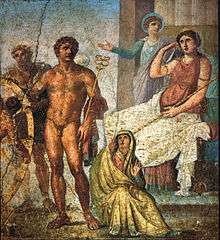Iris (mythology)
| Iris | |
|---|---|
| Goddess of the Rainbow | |
 Morpheus and Iris, by Pierre-Narcisse Guérin, 1811 | |
| Abode | Not specified |
| Symbol | Rainbow |
| Consort | Zephyrus |
| Parents | Thaumas and Electra |
| Siblings | Arke, Aello, Celaeno and Ocypete |
| Children | Pothos |
| Roman equivalent | Iris |

In Greek mythology, Iris (/ˈaɪrᵻs/; Greek: Ἶρις)[1] is the personification of the rainbow and messenger of the gods. She is also known as one of the goddesses of the sea and the sky. Iris links the gods to humanity. She travels with the speed of wind from one end of the world to the other,[2] and into the depths of the sea and the underworld.
In classical literature
According to Hesiod's Theogony, Iris is the daughter of Thaumas and the Oceanid Electra, and the sister of the Harpies: Aello and Ocypete.
During the Titanomachy, Iris was the messenger of the Olympian Gods, while her twin sister Arke betrayed the Olympians and became the messenger of the Titans.
Iris is frequently mentioned as a divine messenger in the Iliad which is attributed to Homer, but does not appear in his Odyssey, where Hermes fills that role. Like Hermes, Iris carries a caduceus or winged staff. By command of Zeus, the king of the gods, she carries an ewer of water from the River Styx, with which she puts to sleep all who perjure themselves. According to Apollonius Rhodius, Iris turned back the Argonauts Zetes and Calais who had pursued the Harpies to the Strophades ('Islands of Turning'). The brothers had driven off the monsters from their torment of the prophet Phineus, but did not kill them upon the request of Iris, who promised that Phineus would not be bothered by the Harpies again.

Iris is married to Zephyrus, who is the god of the west wind. Their son is Pothos (Nonnus, Dionysiaca). According to the Dionysiaca of Nonnos, Iris' brother is Hydaspes (book XXVI, lines 355-365).
In Euripides' play Heracles, Iris appears alongside Lyssa, cursing Heracles with the fit of madness in which he kills his three sons and his wife Megara. In some records she is a sororal twin to the Titaness Arke (arch), who flew out of the company of Olympian gods to join the Titans as their messenger goddess during the Titanomachy, making the two sisters enemy messenger goddesses. Iris was said to have golden wings, whereas Arke had iridescent ones. She is also said to travel on the rainbow while carrying messages from the gods to mortals. During the Titan War, Zeus tore Arke's iridescent wings from her and gave them as a gift to the Nereid Thetis at her wedding, who in turn gave them to her son, Achilles, who wore them on his feet. Achilles was sometimes known as podarkes (feet like [the wings of] Arke.) Podarces was also the original name of Priam, king of Troy.
Iris also appears several times in Virgil's Aeneid, usually as an agent of Juno. In Book 4, Juno dispatches her to pluck a lock of hair from the head of Queen Dido, that she may die and enter Hades. In book 5, Iris, having taken on the form of a Trojan woman, stirs up the other Trojan mothers to set fire to four of Aeneas' ships in order to prevent them from leaving Sicily.
Epithets
Iris had numerous poetic titles and epithets, including Chrysopteron (Golden Winged), Podas ôkea (swift footed) or Podênemos ôkea (wind-swift footed), Roscida (dewy), and Thaumantias or Thaumantos (Daughter of Thaumas, Wondrous One). Under the epithet Aellopus (Ἀελλόπους) she was described as swift-footed like a storm-wind.[3] She also watered the clouds with her pitcher, obtaining the water from the sea.
Representation
Iris is represented either as a rainbow, or as a beautiful young maiden with wings on her shoulders. As a goddess, Iris is associated with communication, messages, the rainbow and new endeavors.
Derivations
In language
- The word iridescence is derived in part from the name of this goddess.
- The adjective for a rainbow is iridal.
- The iris of the eye is named after her, to reflect the many colours of the eye.
- Arcoíris and arco-íris are the words for “rainbow” in Spanish and Portuguese, respectively, where arco means “bow”.
Namesake
Artwork
- Auguste Rodin, Iris, Messenger of the Gods, ca. 1890[4]
- In 1946, Iris was depicted on a 50-franc airmail stamp in France. This was accompanied the same year by a 40-franc airmail stamp depicting a centaur shooting an arrow into the sky.
Fictional adaptations
- Iris appears as a character in William Shakespeare's play The Tempest (1611).
- Iris appears in the Disney movie Fantasia at the end of the segment featuring the Pastoral Symphony by Beethoven.
- Iris is a character used in the Percy Jackson and The Olympians and Heroes of Olympus series by Rick Riordan.
- Iris appears in "Ransom" by Australian author David Malouf.
- Iris is the main character in Iris the colourful by Joan Holub
See also
Notes
- ↑ R. S. P. Beekes has rejected previous Indo-European derivations and suggested a Pre-Greek one (Etymological Dictionary of Greek, Brill, 2009, p. 598).
- ↑ The Iliad, Book II, "And now Iris, fleet as the wind, was sent by Jove to tell the bad news among the Trojans."
- ↑ Homer uses the form Ἀελλόπος, Iliad viii. 409
- ↑ http://www.metmuseum.org/toah/works-of-art/1984.364.7/
References
- Grimal, Pierre, The Dictionary of Classical Mythology, 1996, ISBN 978-0-631-20102-1. "Iris" pp. 237–238
- Peyré, Yves, "Iris." 2009. In A Dictionary of Shakespeare's Classical Mythology (2009-), ed. Yves Peyré. http://www.shakmyth.org/myth/129/iris
- Smith, William; Dictionary of Greek and Roman Biography and Mythology, London (1873). "Iris"
External links
| Wikimedia Commons has media related to Iris (mythology). |
| Wikisource has the text of the 1911 Encyclopædia Britannica article Iris (mythology). |
- "Iris" from Theoi.com
- Hesiod, the Homeric Hymns, and Homerica by Hesiod (English translation at Project Gutenberg)
- The Iliad by Homer (English translation at Project Gutenberg)
- The Argonautica, by c. 3rd century BC Apollonius Rhodius (English translation at Project Gutenberg)
